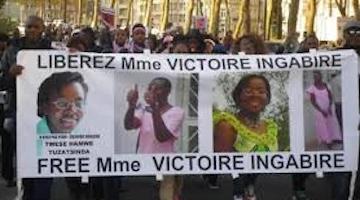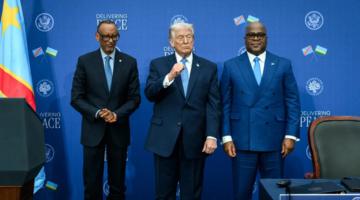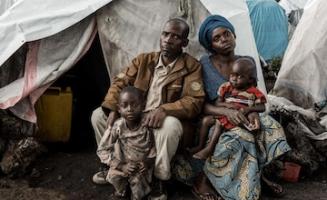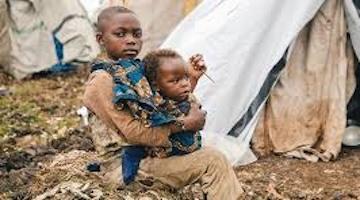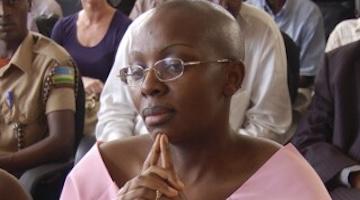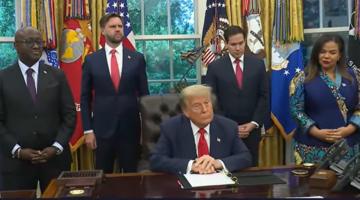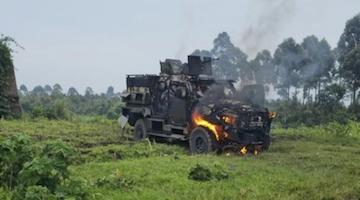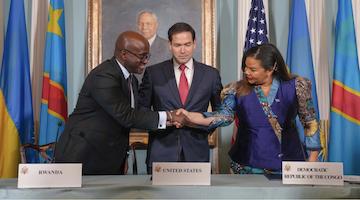“Rwandan dictator Kagame appears to be pursuing his own agenda in Congo by driving local people out and populating their land with newcomers.”
Another slew of Orwellian headlines appeared in the press this week, along with the usual bellicose chants that war is peace, freedom is slavery, and elite security is national security. Those of us who pay attention to the heart of Africa are now being asked to believe that the ADF, a small, beleaguered Ugandan Islamist militia, attacked a UN Peacekeeping Mission in the Democratic Republic of the Congo (DRC) on December 7, killing 15 heavily armed and highly trained Tanzanian peacekeepers and wounding 55 more.
Congolese President Joseph Kabila and Ugandan President Yoweri Museveni are mobilizing a joint deployment of their respective troops to hunt down these phantom Islamists, or so we’ve been told. I discussed a few of the gaping holes in this story with Bard College Professor Helen Epstein, author of the book Another Fine Mess: America, Uganda, and the War on Terror.
Ann Garrison: Helen Epstein, the Congolese government announced several days ago that it had invited Ugandan troops across the Ugandan/Congolese border into the Democratic Republic of the Congo to—they say—help the Congolese army hunt down this so-called ADF Islamist militia that’s said to have attacked Tanzanian UN peacekeepers in Congo. How plausible is this?
Helen Epstein: High-level meetings have been taking place between the militaries of Congo and Uganda, so it certainly seems plausible that the Ugandans could be going back into Congo. What it’s all about and the reasons for it are extremely murky. There was an attack on December 7, in which 15 UN Peacekeepers were killed, and this has been alleged to have been carried out by a Ugandan Islamist group known as the ADF. The Ugandan and Congolese governments want us to believe that the ADF is linked to Islamic terrorists, including Al-Qaeda and Al-Shabaab, but many, many doubts surround this assertion.
AG: Indeed. I’ve interviewed our mutual friend Boniface Musavuli, author of The Massacres of Beni and The Genocides of the Congolese, from Leopold II to Paul Kagame about this ADF militia several times.
HE: This mineral and timber-rich area of Congo isn't really controlled by the Congolese. For decades it's been looted by the Ugandan and Rwandan armies who invaded Congo in 1996 and then again in 1998, and then by Ugandan and Rwandan-backed militias after the 2003 peace treaty was signed.
“This story is full of holes.”
Now there appears to be a false narrative about what's going on circulating in normally reliable circles. According to the Ugandan army, and even the Atlantic Council and MONUSCO, the UN Peacekeeping Mission in DRC itself, this Ugandan Islamist militia—the ADF—has been killing civilians and peacekeepers in DRC all on its own for over three years and is now threatening to invade Uganda. Uganda claims that’s why they’re deploying their army at the border and preparing to pursue the ADF inside Congo.
But this story is full of holes.
AG: Well, there’s a long list of UN investigations documenting the Ugandan army’s mass atrocities and resource plunder in DRC. And in 2005, the UN’s International Court of Justice ruled that Uganda owed DRC $10 billion for these crimes. Shouldn’t these normally reliable circles know that bringing Ugandan troops into Beni is like inviting the fox in to guard the henhouse?
HE: One would think so. There have been even more recent UN experts’ reports that gold, timber, and even ivory are being smuggled across the Congolese border into Uganda and then on for export to international markets.
The assertion that the attack was actually carried out by this Ugandan Islamist militia acting alone is also very much in doubt. The so-called ADF, which has been languishing in Congo for 20 years, is really a very small operation. The Congolese army chased most of them out of the forest in 2014. It’s very hard to believe that they could have carried out such a massive attack that went on for hours, wounded more than 50 soldiers, and killed 15 of them.
“The so-called ADF is really a very small operation.”
AG: The Tanzanian troops are part of the special UN Force Intervention Brigade that the UN Security Council (UNSC) created and gave an offensive mandate in DRC in 2013. That means the Brigade can actually pursue aggressors, not simply defend themselves and the civilians they’re assigned to protect. The UNSC has renewed their offensive mandate every year since. They’re the best armed and best trained peacekeepers in DRC, so it is extremely unlikely that a ragtag, barely extant, forest-based militia could engage them in a fierce, four-hour battle.
The Brigade, most of whose troops were Tanzanian, helped drive the M23 militia across the Congolese border back into Rwanda and Uganda in 2013. Some Congolese are suggesting that Rwandans and Ugandans involved in this attack were partially motivated by vengeance.
MONUSCO officials called it “a well-coordinated and complex operation launched at dusk by attackers armed with mortars and rocket-propelled grenades,” and reported that they took out two armored personnel carriers and an ambulance and truck before withdrawing.
HE: It’s so unlikely that the ADF could have mounted such an attack that it raises the question as to whether placing the blame on them might be just a pretext for Ugandan troops’ re-entry into the country. And if that’s true, it raises the question of who actually did attack the peacekeepers and why.
“it is extremely unlikely that a ragtag, barely extant, forest-based militia could engage the Tanzanian trooips in a fierce, four-hour battle.”
AG: UN investigators have accused Congolese troops of attacking the Congolese people in Beni Territory, North Kivu, and in Kasai for that matter. Boniface Musavuli says that some Congolese troops and commanders are part of the resource-trafficking networks that include Rwandans and Ugandans, and they all want the indigenous Congolese out of the way. So some people are concluding that Congolese troops were involved in the December 7 attack. The Congo Research Group reported that the attackers wore Congolese uniforms and even included Congolese officers that the peacekeepers recognized.
HE: It’s very, very mysterious. Part of the reason it’s been so hard to untangle is that this long series of brutal attacks in this region since 2013 seems to be the responsibility of an amalgam of different groups. Some of them may be former ragtag members of the ADF, but they also include commanders of the Congolese army and former members of Rwandan-backed rebel groups such as the CNDP and M23. And what the purpose of all this is, nobody really knows, but it doesn’t seem to be furthering the ADF’s professed aims, which are to destabilize or even overthrow the Ugandan government.
AG: If you study the Congo Research Group’s map of massacres committed in Beni Territory between December 2013 and January 2016, it’s clear that the perpetrators were moving west, away from the Ugandan border and deeper into DRC—not east toward the Ugandan border and the government that the ADF may have wanted to overthrow at some point in its past.
HE: It seems much more likely that it has to do with territorial ambitions within DRC, and some sort of strategy to take over this part of the country, but nobody knows exactly who’s doing it.
AG: Well, since there’s no group with any clearly defined political objective, it seems natural to conclude that the real objectives are control of the territory and the illegal resource extraction and smuggling in this corner of DRC.
HE: Well, that does seem to be the name of the game in this region, and there’s enormous competition for resources there. And this particular area of Beni is a kind of crossroads. Virtually all trade in the region has to go through there.
AG: The Congo Research Group reports that the attack on the Tanzanian peacekeepers was part of a battle for the control of the Mbau-Kamango road that goes through the Virunga Park, crosses the Semuliki River, and leads to the Ugandan border at Nobili. Sounds like a key smuggling route.
HE: Yes, but that doesn’t seem to be all there is to it. Another factor is that there have been numerous reports, including reports from the UN High Commission on Refugees (UNHCR), that Rwandan peasants have been moving to Beni in huge numbers, particularly into areas where there have been recent attacks. No one quite knows why. There seem to be many thousands of them just appearing, and many of them claim to be returned refugees coming back to their homelands, but they don’t seem to know where they are and don’t even speak Swahili or don’t speak it very well, even though that’s the lingua franca of that area. Instead they seem to be native Kinyarwanda speakers coming from Rwanda. Nobody knows why they are occupying this area and in many cases occupying the very areas from which the native people of Congo have fled.
“It seems much more likely that it has to do with territorial ambitions within DRC, and some sort of strategy to take over this part of the country.”
AG: Rwandan President Paul Kagame’s desire to annex the Kivu Provinces, or at least North Kivu, has been manifest for years. U.S. policymakers and pundits have advocated creating a free-trade zone, that would legalize cross-border trade in the region.
Advocates of this plan include two former US Assistant Secretaries of State for African Affairs, Herman Cohen and Johnnie Carson, and humanitarian militarist John Prendergast, founder of the ENOUGH Project to stop genocide and crimes against humanity. This would, they say, legalize the illicit trade now going on, and thereby reduce conflict and increase opportunities for Rwandans, as well as Ugandans, Tanzanians and others. But while the West looks the other way, Kagame appears to be pursuing his own agenda by driving local people out and populating their land with newcomers. The fear is that de facto annexation might then become official through some sort of referendum in which the newcomers are given the right to vote.
HE: That’s certainly one plausible explanation for the arrival of so many Rwandans.
There’s a lot of mysterious, violent activity going on in this entire region, and many people are scratching their heads as to what it’s really all about, and we aren’t getting many answers from the UN Peacekeeping Mission—MONUSCO—which is stationed there in Kivu Province, and that’s a big disappointment. Nor are we getting any clear signals from the UNSC. So again, we could hope for more clarity on this because if Uganda really is going to get involved, it’s going to get ugly because wherever the Ugandan army goes, it does.
There are also rumors that Ugandan President Yoweri Museveni and Rwandan President Paul Kagame are at odds again, as they have been off and on throughout their decades of both collaboration and rivalry in Congo.
“If Uganda really is going to get involved, it’s going to get ugly.”
AG: There’ve even been rumors that Kagame has been plotting to assassinate Museveni. The Ugandan newspaper The Red Pepper was shut down and its editors arrested for publishing them. I haven’t seen any hard evidence of that, but Kagame is implicated in the assassinations and attempted assassinations of other political opponents abroad.
And if Museveni—or Kagame—were assassinated, one or the other would be the fifth president assassinated in the African Great Lakes Region in the past 25 years. Evidence points to Kagame’s complicity in at least three of the other four: the assassinations of Rwandan President Juvenal Habyarimana and Burundian President Cyprien Ntaryamira in 1994 and the assassination of Congolese President Laurent Desiré Kabila in 2001. Kagame replaced Habyarimana himself and Congolese President Joseph Kabila replaced his adoptive father Laurent. The younger Kabila was quick to state that he was more willing to accommodate US, Ugandan, and Rwandan interests than his father had been.
HE: There were many factors, forces, and interests at work then, as there are now.
AG: Neither MONUSCO nor the UNSC seem to have objected to the joint Congolese and Ugandan operation in Beni Territory, despite the long history of both armies’ crimes against the indigenous population there.
HE: Well, we’ll have to wait and see what the Ugandan army does in Congo. The people of this region have suffered so much already that it’s very frightening to think of what could happen.
AG: This morning Radio Okapi—MONUSCO’s outlet—reported push back at the Congolese government over the proposed joint Congolese and Ugandan deployment: “At the announcement of the meeting of Kasindi-Lubiriha, several voices were raised to oppose a possible joint military operation of the Ugandan and Congolese armies against the Ugandan rebels of the ADF. The Beni civil society, for example, fears that the Ugandan army will move to the region in the name of the hunt for these rebels."
HE: Yes, I just read that. It said the two armies had agreed to set up a network for sharing information about the ADF militia but to stay on their own sides of the border for the time being, though they didn’t rule out a future joint operation.
AG: The Congolese government was urging the people of Beni not to be alarmed by the sight of Ugandan troops amassed at the border because they won’t cross.
HE: Well, I’m sure they’re alarmed nevertheless. There may well be Ugandan-backed forces in Beni now even if they aren’t wearing Ugandan uniforms, but it sounds as though the army won’t go in as itself for now.
Ann Garrison is an independent journalist based in the San Francisco Bay Area. In 2014, she received the Victoire Ingabire Umuhoza Democracy and Peace Prize for her reporting on conflict in the African Great Lakes region. She can be reached at @AnnGarrison or ann@kpfa.org.
Helen Epstein is a Bard College professor and author of “Another Fine Mess: America, Uganda, and the War on Terror.” She has spent decades doing public health research in the African Great Lakes Region. She can be reached at hepstein@bard.edu

